Search titles
Displaying results 1 to 10 of 38.
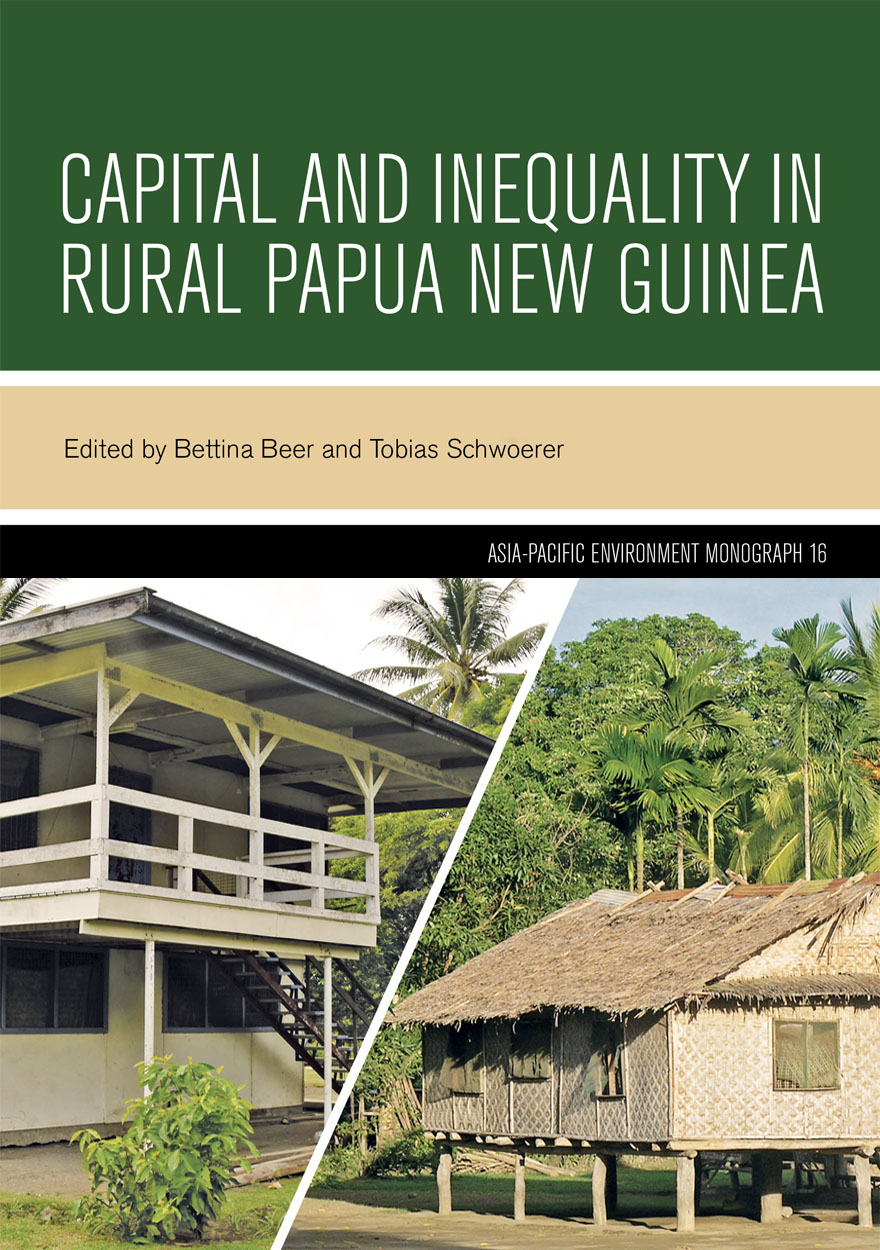
Capital and Inequality in Rural Papua New Guinea »
Edited by: Bettina Beer, Tobias Schwoerer
Publication date: July 2022
That large-scale capital drives inequality in states like Papua New Guinea is clear enough; how it does so is less clear. This edited collection presents studies of the local contexts of capital-intensive projects in the mining, oil and gas, and agro-industry sectors in rural and semi-rural parts of Papua New Guinea; it asks what is involved when large-scale capital and its agents begin to become significant nodes in hitherto more local social networks. Its contributors describe the processes initiated by the (planned) presence of extractive industries that tend to reinforce already existing inequalities, or to create and socially entrench novel inequalities.
The studies largely focus on the beginnings of such transformations, when hopes for social improvement are highest and economic inequalities still incipient. They show how those hopes, and the encompassing socio-political transformations characteristic of this phase, act to produce far-reaching impacts on ways of life, setting precedents for and embedding the social distribution of gains and losses. The chapters address a range of settings: the PNG Liquid Natural Gas pipeline; newly established eucalyptus and oil palm plantations; a planned copper-gold mine; and one in which rumours of development diffuse through a rural social network as yet unaffected by any actual or planned capital investments. The analyses all demonstrate that questions around land, leadership and information are central to the current and future social profile of local inequality in all its facets.

International Review of Environmental History: Volume 7, Issue 2, 2021 »
Edited by: James Beattie
Publication date: November 2021
The second issue of International Review of Environmental History for 2021 features contributions on limpets and global environmental history, US bird conservation, soyabean agriculture in South America, settler environmental change in Aotearoa New Zealand, woodlands, communities and ecologies in Australia, and irrigation and agriculture in Australia.
Download for free
Not available for purchase

The Absent Presence of the State in Large-Scale Resource Extraction Projects »
Edited by: Nicholas A. Bainton, Emilia E. Skrzypek
Publication date: August 2021
Standing on the broken ground of resource extraction settings, the state is sometimes like a chimera: its appearance and intentions are misleading and, for some actors, it is unknowable and incomprehensible. It may be easily mistaken for someone or something else, like a mining company, for example.
With rich ethnographic material, this volume tackles critical questions about the nature of contemporary states, studied from the perspective of resource extraction projects in Papua New Guinea, Australia and beyond. It brings together a sustained focus on the unstable and often dialectical relationship between the presence and the absence of the state in the context of resource extraction. Across the chapters, contributors discuss cases of proposed mining ventures, existing large-scale mining operations and the extraction of natural gas. Together, they illustrate how the concept of absent presence can be brought to life and how it can enhance our understanding of the state as well as relations and processes forming in extractive contexts, thus providing a novel contribution to the anthropology of the state and the anthropology of extraction.
‘The Absent Presence fills a major gap in our knowledge about the relationship between states and companies – at a time when resource extraction seems to be more contested than ever. Bainton and Skrzypek have curated an incredibly impressive volume that should be read by all those interested in exploring corporate and state power, and the ever-present impacts of extraction. A highly recommended read.’
— Professor Deanna Kemp, Director of the Centre for Social Responsibility in Mining, The University of Queensland
‘Countless books have been written on the sovereign state and how it imposes a particular kind of order on economic and social interactions. What is original and compelling about this collection is the portrait of how two very different states converge when it comes to “extractive ventures”. From the presumption of exclusive sovereignty over mineral resources, to the bargains that are struck with major (often global) corporations, and the relative indifference to environmental impacts, there is a remarkable consistency in the patterns that are referred to as “state effects”. These effects are brought from the background to the foreground in this book through the blending of creative and critical thinking with detailed empirical research.’
— Tim Dunne, Pro-Vice-Chancellor and Professor of International Relations, The University of Queensland
‘This brilliant and intriguing title provides a timely contribution to understanding the actual functions and strategies of state (and state-like) institutions in resource arenas. The dialectics of presence-absence and its refractions at different levels and scales of government allow the authors to go beyond stereotypes about the (strong, weak, failed or corrupt) state, highlighting more commonalities than expected between Papua New Guinea and Australia, and even New Caledonia.’
— Dr Pierre-Yves Le Meur, Anthropologist, Senior Researcher, French National Research Institute for Sustainable Development, Joint Research Unit SENS (Knowledge Environment Society)
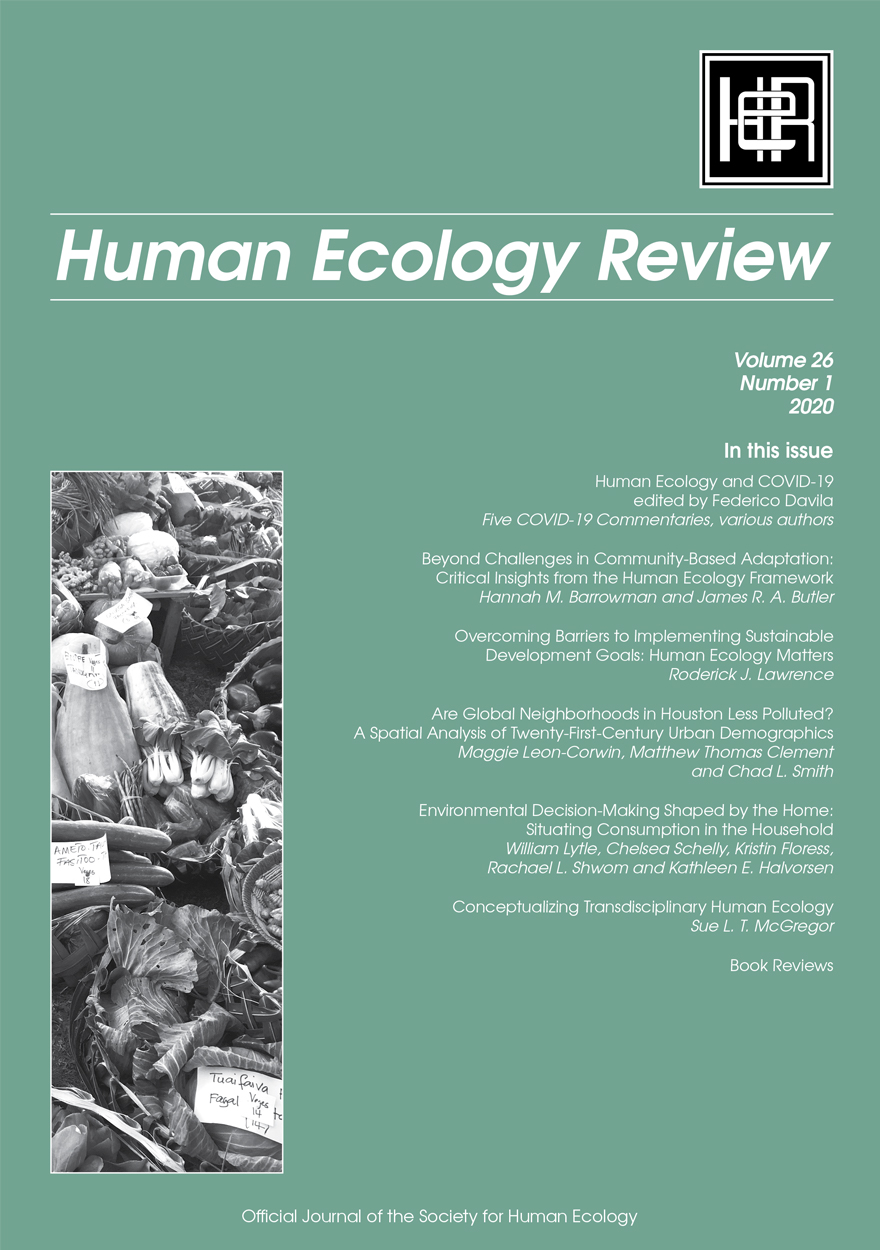
Human Ecology Review: Volume 26, Number 1 »
Publication date: April 2021
Human Ecology Review is a semi-annual journal that publishes peer-reviewed interdisciplinary research on all aspects of human–environment interactions (Research in Human Ecology). The journal also publishes essays, discussion papers, dialogue, and commentary on special topics relevant to human ecology (Human Ecology Forum), book reviews (Contemporary Human Ecology), and letters, announcements, and other items of interest (Human Ecology Bulletin). Human Ecology Review also publishes an occasional paper series in the Philosophy of Human Ecology and Social–Environmental Sustainability.
Download for free
Not available for purchase
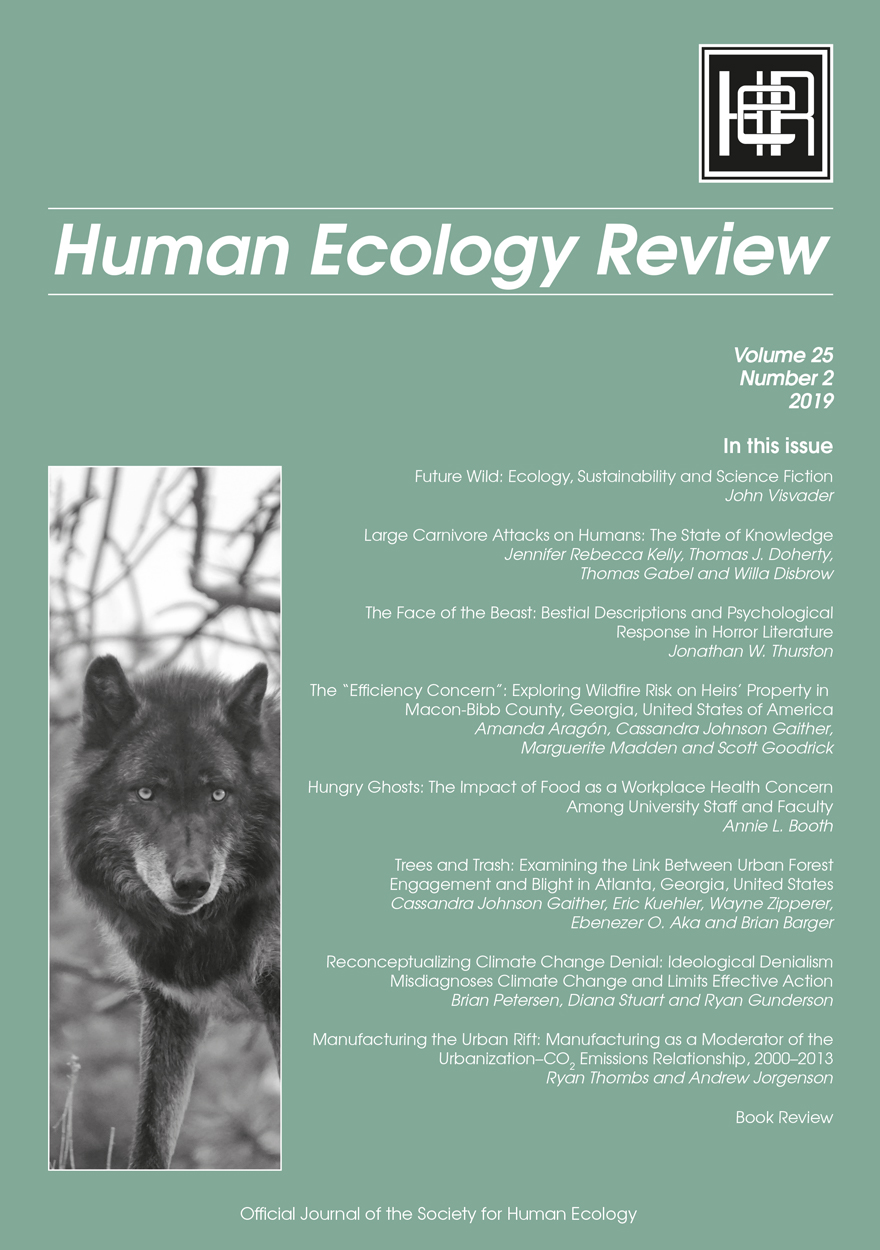
Human Ecology Review: Volume 25, Number 2 »
Publication date: December 2019
Human Ecology Review is a semi-annual journal that publishes peer-reviewed interdisciplinary research on all aspects of human–environment interactions (Research in Human Ecology). The journal also publishes essays, discussion papers, dialogue, and commentary on special topics relevant to human ecology (Human Ecology Forum), book reviews (Contemporary Human Ecology), and letters, announcements, and other items of interest (Human Ecology Bulletin). Human Ecology Review also publishes an occasional paper series in the Philosophy of Human Ecology and Social–Environmental Sustainability.
Download for free
Not available for purchase
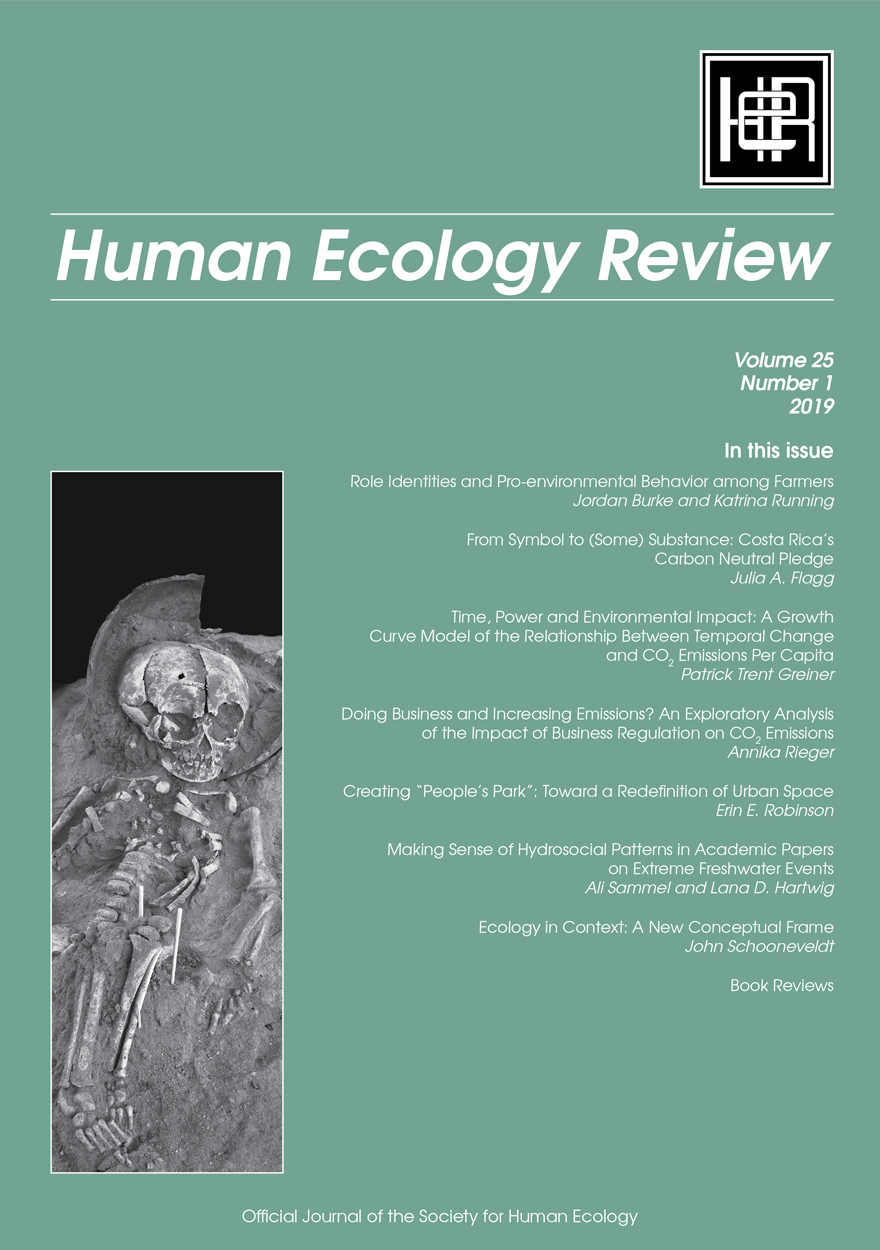
Human Ecology Review: Volume 25, Number 1 »
Publication date: August 2019
Human Ecology Review is a semi-annual journal that publishes peer-reviewed interdisciplinary research on all aspects of human–environment interactions (Research in Human Ecology). The journal also publishes essays, discussion papers, dialogue, and commentary on special topics relevant to human ecology (Human Ecology Forum), book reviews (Contemporary Human Ecology), and letters, announcements, and other items of interest (Human Ecology Bulletin). Human Ecology Review also publishes an occasional paper series in the Philosophy of Human Ecology and Social–Environmental Sustainability.
Download for free
Not available for purchase
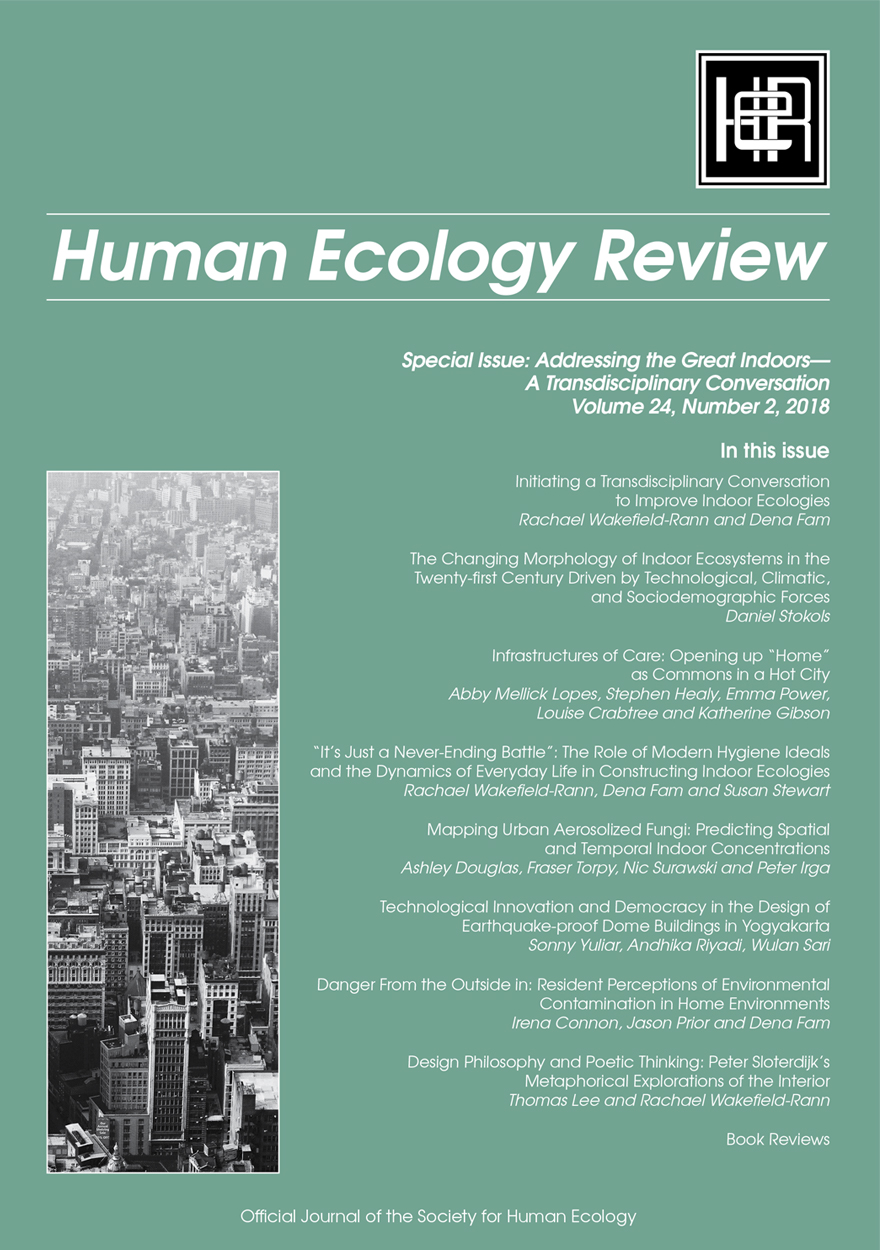
Human Ecology Review: Volume 24, Number 2 »
Special Issue: Addressing the Great Indoors — A Transdisciplinary Conversation
Publication date: December 2018
Human Ecology Review is a semi-annual journal that publishes peer-reviewed interdisciplinary research on all aspects of human–environment interactions (Research in Human Ecology). The journal also publishes essays, discussion papers, dialogue, and commentary on special topics relevant to human ecology (Human Ecology Forum), book reviews (Contemporary Human Ecology), and letters, announcements, and other items of interest (Human Ecology Bulletin). Human Ecology Review also publishes an occasional paper series in the Philosophy of Human Ecology and Social–Environmental Sustainability.
Download for free
Not available for purchase
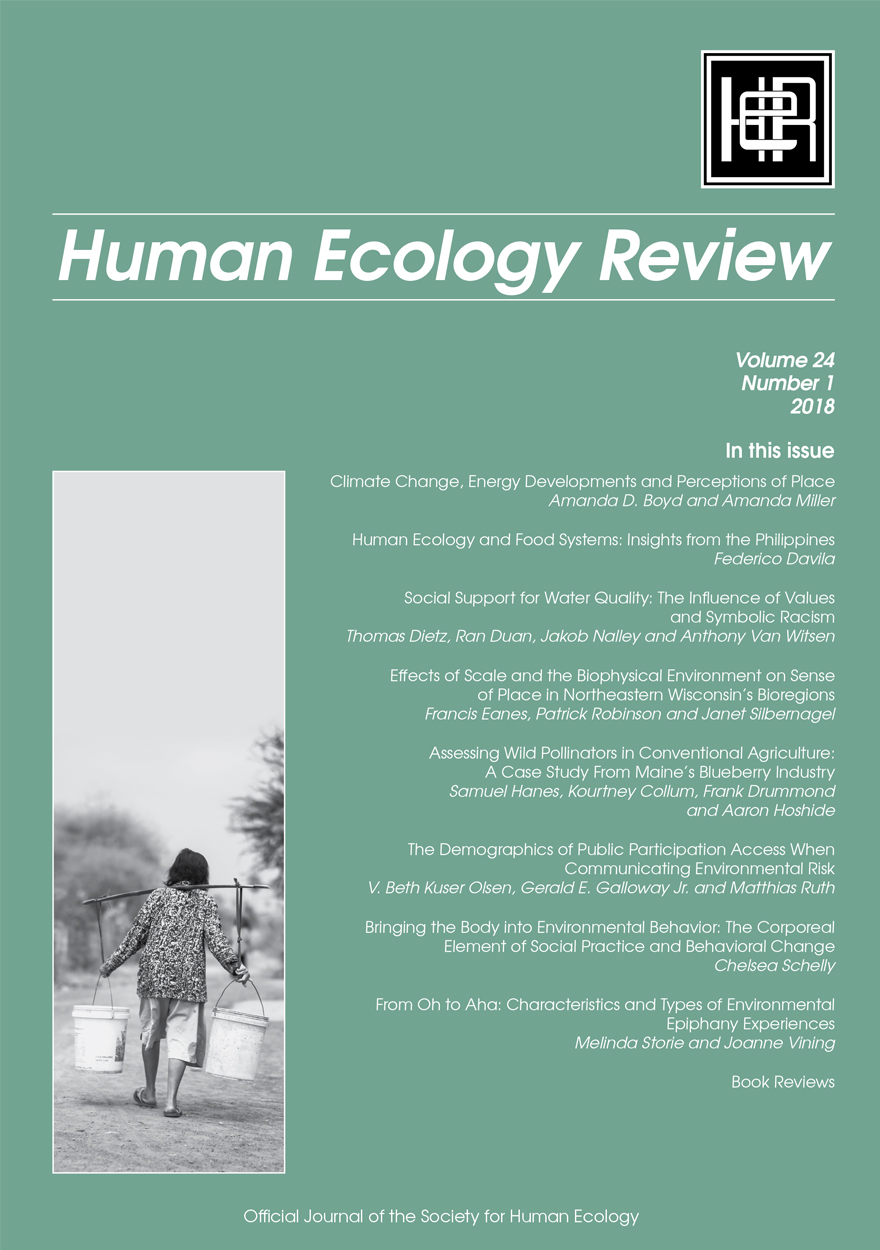
Human Ecology Review: Volume 24, Number 1 »
Publication date: September 2018
Human Ecology Review is a semi-annual journal that publishes peer-reviewed interdisciplinary research on all aspects of human–environment interactions (Research in Human Ecology). The journal also publishes essays, discussion papers, dialogue, and commentary on special topics relevant to human ecology (Human Ecology Forum), book reviews (Contemporary Human Ecology), and letters, announcements, and other items of interest (Human Ecology Bulletin). Human Ecology Review also publishes an occasional paper series in the Philosophy of Human Ecology and Social–Environmental Sustainability.
Download for free
Not available for purchase

The Quest for the Good Life in Precarious Times »
Ethnographic Perspectives on the Domestic Moral Economy
Edited by: Chris Gregory, Jon Altman
Publication date: April 2018
The study of the quest for the good life and the morality and value it presupposes is not new. To the contrary, this is an ancient issue; its intellectual history can be traced back to Aristotle. In anthropology, the study of morality and value has always been a central concern, despite the claim of some scholars that the recent upsurge of interest in these issues is new. What is novel is how scholars in many disciplines are posing the value question in new ways. The global economic alignments of the present pose many political, moral and theoretical questions, but the central issue the essays in this collection address is: how do relatively poor people of the Australia–Pacific region survive in current precarious times? In looking to answer this question, contributors directly engage the values and concepts of their interlocutors. At a time when understanding local implications of global processes is taking on new urgency, these essays bring finely honed anthropological perspectives to matters of universal human concern—they offer radical empirical critique based on intensive fieldwork that will be of great interest to those seeking to comprehend the bigger picture.

Vietnam’s Post-1975 Agrarian Reforms »
How local politics derailed socialist agriculture in southern Vietnam
Authored by: Trung Dang
Publication date: April 2018
This book investigates why collectivised farming failed in south Vietnam after 1975. Despite the strong will of the new regime to implement collectivisation, the effort was uneven, misapplied and subverted. After only 10 years of trying, the regime annulled the policy. Focusing on two case studies—Quảng Nam province in the Central Coast region and An Giang province in the Mekong Delta—and based on extensive evidence, this study argues that the reasons for variations in implementation and the failure and reversal of the policy were twofold: regional differences and local politics.



